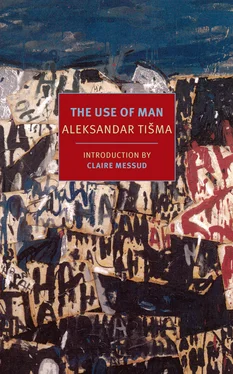Aleksandar Tišma - The Use of Man
Здесь есть возможность читать онлайн «Aleksandar Tišma - The Use of Man» весь текст электронной книги совершенно бесплатно (целиком полную версию без сокращений). В некоторых случаях можно слушать аудио, скачать через торрент в формате fb2 и присутствует краткое содержание. Год выпуска: 2014, Издательство: NYRB Classics, Жанр: Современная проза, на английском языке. Описание произведения, (предисловие) а так же отзывы посетителей доступны на портале библиотеки ЛибКат.
- Название:The Use of Man
- Автор:
- Издательство:NYRB Classics
- Жанр:
- Год:2014
- ISBN:нет данных
- Рейтинг книги:5 / 5. Голосов: 1
-
Избранное:Добавить в избранное
- Отзывы:
-
Ваша оценка:
- 100
- 1
- 2
- 3
- 4
- 5
The Use of Man: краткое содержание, описание и аннотация
Предлагаем к чтению аннотацию, описание, краткое содержание или предисловие (зависит от того, что написал сам автор книги «The Use of Man»). Если вы не нашли необходимую информацию о книге — напишите в комментариях, мы постараемся отыскать её.
A work of stark poetry and illimitable sadness,
is one of the great books of the 20th century.
The Use of Man — читать онлайн бесплатно полную книгу (весь текст) целиком
Ниже представлен текст книги, разбитый по страницам. Система сохранения места последней прочитанной страницы, позволяет с удобством читать онлайн бесплатно книгу «The Use of Man», без необходимости каждый раз заново искать на чём Вы остановились. Поставьте закладку, и сможете в любой момент перейти на страницу, на которой закончили чтение.
Интервал:
Закладка:
He looked at Kroner plaintively, hoping for a word of comfort. Hoping for him to say: “No, no, you’re wrong. One day they will all be wiped out.” But Kroner merely looked at him dumbly, large beads of sweat trickling from the line of his smooth black hair down over his rounded forehead, like a crown of thorns. He was breathing heavily, almost groaning. The story just recounted had been like a nightmare for him, a madman’s vision. The madman was his own brother-in-law; and if he wasn’t mad, if anything at all of this account had actually taken place, then it was the world that was mad, and Kroner could not believe that to be so, still feeling himself very much part of that world.
Instead of rejecting the gruesome story, as Sep had half hoped, Kroner asked for more details, as if he were faced with a sick man who had to be humored. He asked Sep first for one thing and then for another, where the pit was, how far from town and in which direction, what ammunition the soldiers used and who supplied it, if food was brought to them, how they coped with thirst, who buried the corpses. But Sep, without a moment’s thought, though annoyed at being distracted from the essentials of the story, answered every question, and the madness of the tale was not only not refuted, but it began to take on the fullness of truth.
Kroner was seized by a fresh horror: a reality that assumed the features of a nightmare. Where could he escape? From the course the war was taking, he was firmly convinced that in the end the Germans would be defeated, but now he understood that that would not save him from the steam roller of their insanity. The insanity was already rolling; Sep was its herald; tomorrow it would burst into this town, into this house. Feverishly he tried to think of a way it might be stopped. What if there were a revolt? He imagined the whole of Novi Sad, all of those who were threatened, rising up seizing any weapons that came to hand, attacking the barracks of the killers. If everyone did that — even if only every second or third man between age twenty and fifty did that, responding to the duty of his adult years, just as those on the enemy side were forced into service — then the revolt would succeed. Then he, Kroner, too, would have to take up a weapon, the first that came to hand — the revolver that hung at Sep Lehnart’s waist— and shoot at the first enemy he saw: Sep Lehnart himself.
Kroner looked at his brother-in-law and imagined that act. He stretched out his hand under the table and clenched his fingers, practicing the movement that would open the holster and pull out the gun. And then the shot! At Sep’s heart! But the thought alone made his forehead bead again with sweat. He couldn’t shoot at a living body; he was not prepared for it, not trained for it; he was a noncombatant, whose father had bribed someone to get him listed as such when he had had to go to Vienna, and he had been thankful to his father for that at the time. But now he felt that something was missing in his character. His inability to shed blood seemed like some kind of physical defect that made him inferior to other people. It was the defect of whole generations of his people, who regarded the soldier’s trade as a waste of time, something that the Christian, who had a country of his own, might do, but not the wandering Jew. Suddenly he felt contempt for that people, who — like himself, as an individual — trembled at the thought of taking a revolver from its holster and emptying it into the enemy’s heart.
Stinking, cowardly vermin! He hissed to himself, against the people to whom he belonged, in the very words of Sep Lehnart: stinking cowardly vermin, who deserved to be killed, since they themselves were unable to kill.
12
Several months later, when the sun invaded the streets, the blinds on the windows had to stay down the entire day, and the small table lamp next to the radio was switched on for reading, Robert Kroner’s room was the scene of very different conversations, even though they concerned the same, or similar, life-and-death matters. In the half-light, which the depths of the room dispersed into an uncertain haze, all that Robert Kroner and Milinko Božić could see of each other was the yellow surfaces of their cheeks, foreheads, and the backs of their hands, like blurs on a film negative. It did not bother them that they could not see each other clearly; in fact, they liked it, for each could talk freely, without fear of noticing any sign in the other that he had gone too far, either in what was said or in how it was said. They seemed to be unusually sincere with one another, which was remarkable considering their relationship: Vera’s father and Vera’s boyfriend.
They did not refer to that relationship — it would have made things difficult — and when they mentioned its source, Vera, it was almost as if their roles were reversed: Milinko was the one who worried about her and wanted to curb her independence, whereas Kroner warned him not to be too strict and too mistrustful. The moment they met, like two elements naturally and mutually attracted, there passed between them a current of such kinship that the real, vital issue was pushed into the background. Milinko, who previously had confided only in his mother, realized, looking at Kroner’s thoughtful and attentive face, that till now his innermost thoughts had been thrown away into an abyss of incomprehension. And his father, whom he had already begun to forget, he now remembered again with new contempt.
Kroner, on the other hand, discovered in Milinko something that he had not found in either his son or his daughter: youthful appreciation. How had he destroyed this in his own children? He didn’t know exactly, but believed that part of the blame was borne by his wife, who had been overprotective and kept them away from his influence. Out of anger toward her, and then in spiteful resignation, becoming at last corrupted by the comfortable convenience his isolation gave him, he withdrew completely. Growing up without his direct control, the children never got to know him, and became more and more distant.
Vera was calm and dreamily absent: she never caused trouble, but her participation in the life of the family was limited to carrying out her basic obligations, and meant, in practice, an independence greater than rebellion. When he spoke to her, she would look at him thoughtfully with her slanting eyes, eyes that troubled him with their impenetrable beauty and that for some reason made him think of the women he encountered at Olga Herzfeld’s, so he would turn red and lower his own eyes. But when he watched her as she listened to her mother, he could read in her pouting profile, with its upturned nose, total indifference to what she was hearing, and he guessed that she listened to him in exactly the same way. He realized that what shone from her, and most strikingly from her eyes when she faced him, was not attention to what he was saying, but a wholly personal self-absorbed excitement. What that excitement was, he could never bring himself to ask, afraid lest her answer, if for once it was sincere, confirm his intimation of Mrs. Herzfeld’s house. That was why, after she became grown up, he had tended to avoid her. He did not avoid his son, but there were always conflicts with him. Gerhard hid nothing, he expounded provocatively on whatever came into his head. He was always looking for someone to talk to, just like Sep, and he resembled his uncle also in the vehemence of his opinions. In their content, too, because he ridiculed — though on a higher, more intellectual level, since he was better educated than Sep — his father’s humanitarian, moderate ideas.
Robert Kroner based his thinking on the broadcasts of Radio London, which called upon Europe to put up a resolute, long-term resistance against the barbaric Germans in the expectation of an Anglo-Saxon invasion of the Continent that would bring salvation and a new order, an order humanitarian, of course, and democratic. Hitler, infuriated by such beneficence, in his hoarse speeches called this appeal and promise the paranoid delusion of the Jews and plutocrats. Sep Lehnart, too, by his tales of massacres, which later became a reality in Novi Sad, gave the lie to the Allied chances of success, and Gerhard found both arguments convincing. Unlike the female members of the family, who were uninformed, Gerhard had access to his father’s room even during those sacred hours when the radio, its volume turned down, followed the signal of three short dots and single dash by flooding the soft nighttime silence with a river of encouragement in the name of justice and people’s rights. Rarely was he patient enough to hear out these assurances of his survival. “Hah!” He would laugh drily, curtly. “Nonsense!” He scoffed at any hopeful news and made remarks as the announcers, commentators, writers, or politicians spoke in their English-contaminated Serbian or German. This irritated his father, who was hunched over in front of the darkened circle on the speaker. “Shhh!” he would say, waving his bony hand. “I can’t hear!” At which Gerhard would shrug disdainfully and wander around the room or the adjacent dining room, making sure that his shoes squeaked as loudly as possible. Nevertheless, he always remained within earshot of the broadcast, and his father always let him resume his uncompromising opposition after that nervous pacing. It was as if the two hoped that suddenly an item of news might provoke the same reaction from both. They went on listening, until Gerhard once again broke in, loudly deriding as naïve some forecast of a quick and favorable conclusion to the war, or fumed because of the exaggerated patriotism that London asked of its supporters on the Continent.
Читать дальшеИнтервал:
Закладка:
Похожие книги на «The Use of Man»
Представляем Вашему вниманию похожие книги на «The Use of Man» списком для выбора. Мы отобрали схожую по названию и смыслу литературу в надежде предоставить читателям больше вариантов отыскать новые, интересные, ещё непрочитанные произведения.
Обсуждение, отзывы о книге «The Use of Man» и просто собственные мнения читателей. Оставьте ваши комментарии, напишите, что Вы думаете о произведении, его смысле или главных героях. Укажите что конкретно понравилось, а что нет, и почему Вы так считаете.












